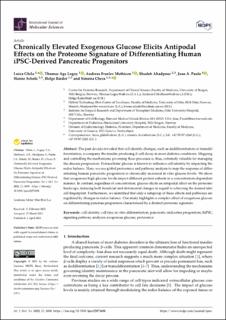Chronically elevated exogenous glucose elicits antipodal effects on the proteome signature of differentiating human iPSC-derived pancreatic progenitors
Ghila, Luiza; Legøy, Thomas Aga; Mathisen, Andreas Frøslev; Abadpour, Shadab; Paulo, Joao A.; Scholz, Hanne Bjørnson; Ræder, Helge; Chera, Simona
Journal article, Peer reviewed
Published version

Åpne
Permanent lenke
https://hdl.handle.net/11250/2832043Utgivelsesdato
2021-04-02Metadata
Vis full innførselSamlinger
- Department of Clinical Science [2317]
- Registrations from Cristin [9766]
Originalversjon
International Journal of Molecular Sciences. 2021, 22 (7), 3698. 10.3390/ijms22073698Sammendrag
The past decade revealed that cell identity changes, such as dedifferentiation or transdifferentiation, accompany the insulin-producing β-cell decay in most diabetes conditions. Mapping and controlling the mechanisms governing these processes is, thus, extremely valuable for managing the disease progression. Extracellular glucose is known to influence cell identity by impacting the redox balance. Here, we use global proteomics and pathway analysis to map the response of differentiating human pancreatic progenitors to chronically increased in vitro glucose levels. We show that exogenous high glucose levels impact different protein subsets in a concentration-dependent manner. In contrast, regardless of concentration, glucose elicits an antipodal effect on the proteome landscape, inducing both beneficial and detrimental changes in regard to achieving the desired islet cell fingerprint. Furthermore, we identified that only a subgroup of these effects and pathways are regulated by changes in redox balance. Our study highlights a complex effect of exogenous glucose on differentiating pancreas progenitors characterized by a distinct proteome signature.
